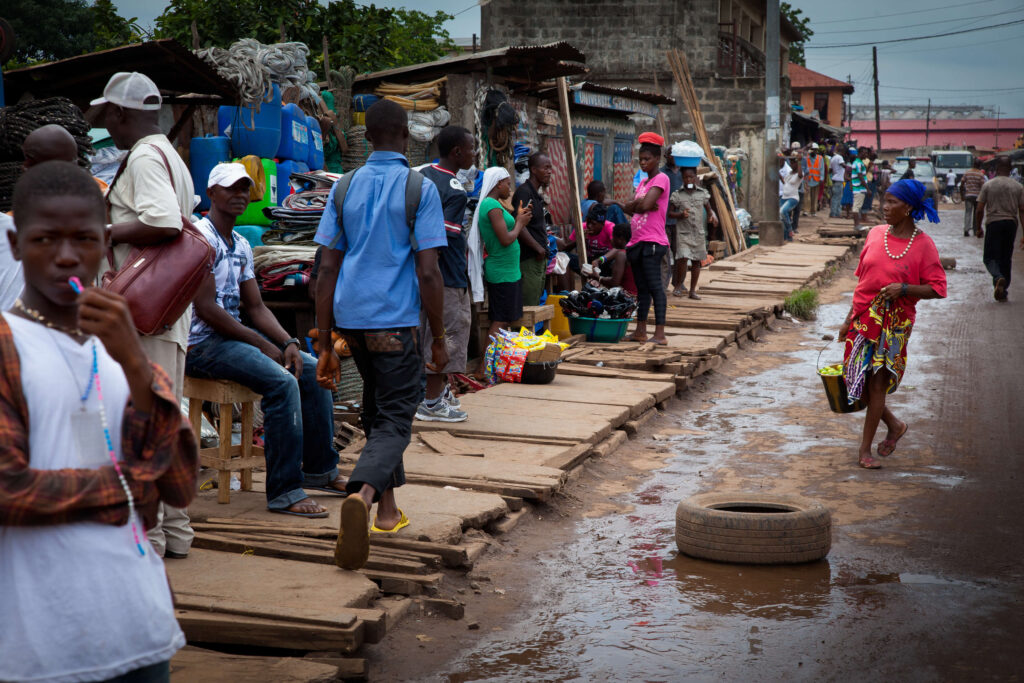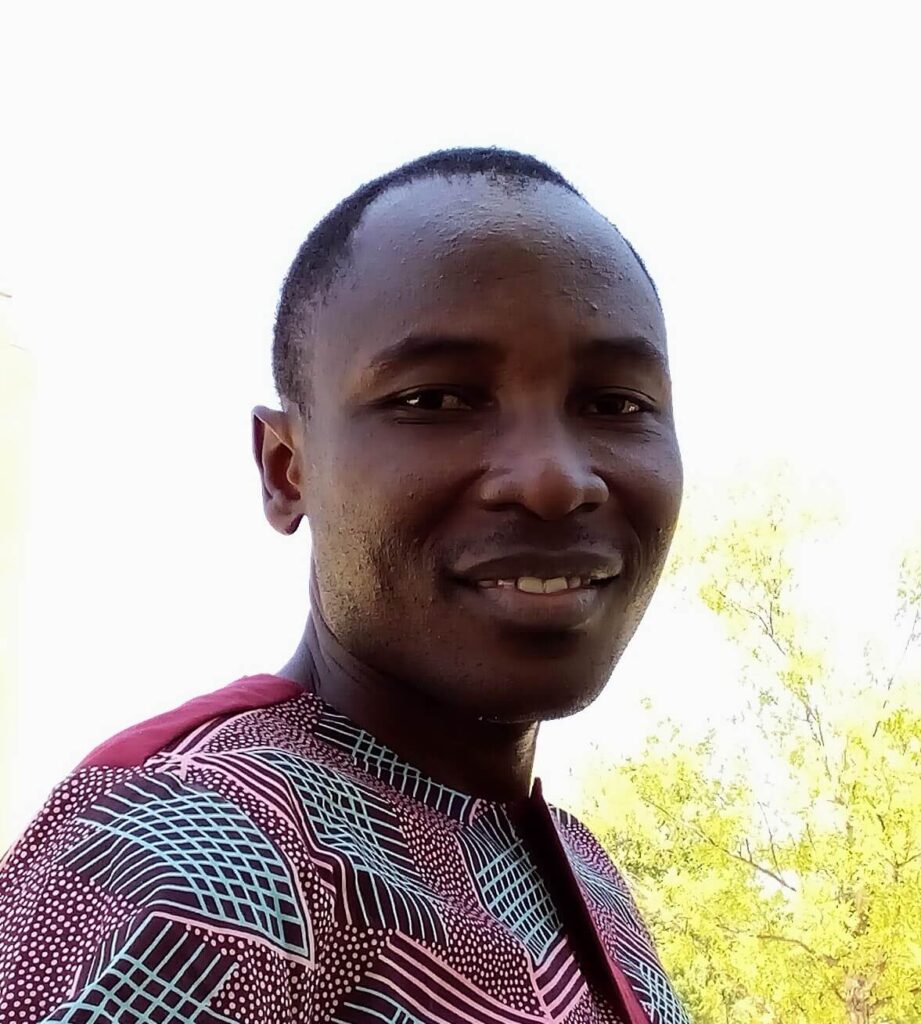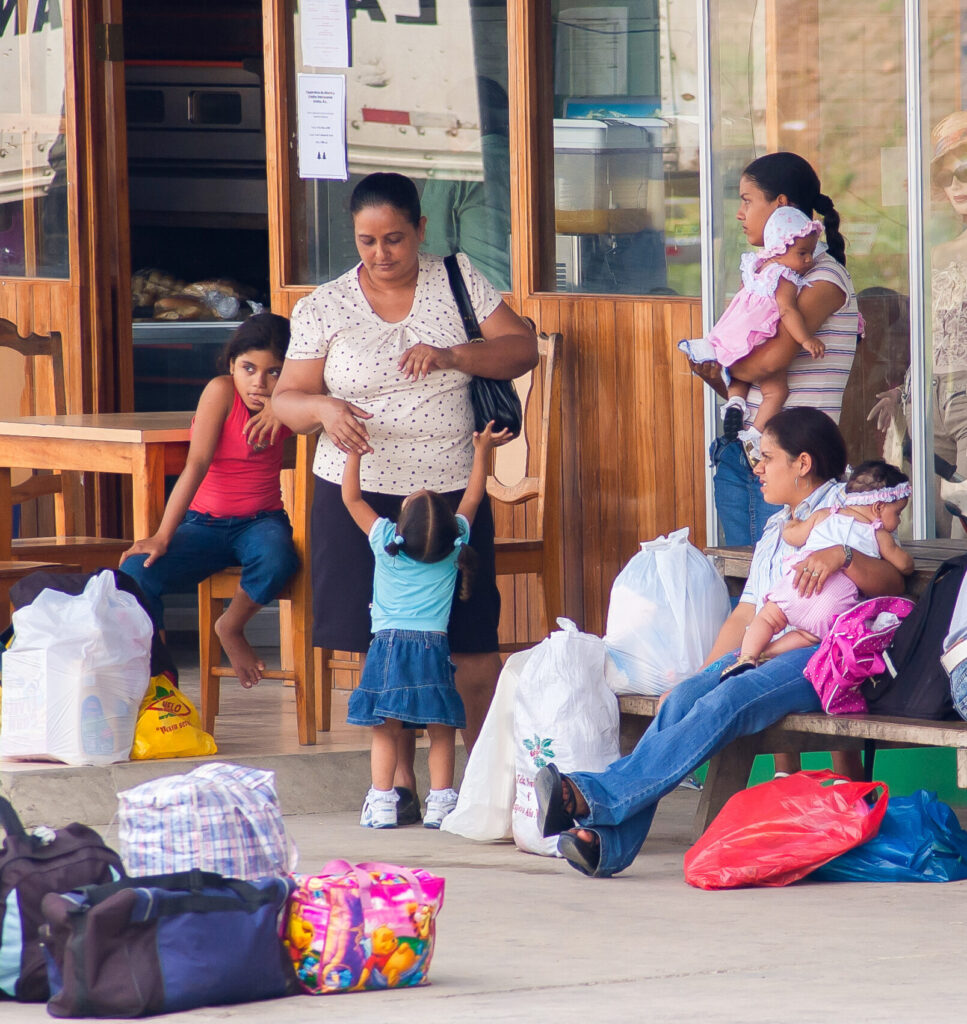
Sierra Leone is a highly climate-vulnerable country, meaning that most of the population does not have appropriate coping strategies or resources to deal with the unpredictable effects of climate-related shocks. The country is also heavily dependent on agriculture. In 2020, the IMF found that the agricultural sector in Sierra Leone employed 54 percent of the population, and, together with fishing and tourism, it contributed 59 percent to the country’s GDP. Today, limited access to finance or crop insurance makes it challenging for farmers to manage climate-related risks, exacerbating the link between Sierra Leone’s climate vulnerability and poverty.
In partnership with Boston University’s Fulbright Humphrey Fellowship, CFI worked closely with Humphrey Fellow Alfred Jusu to conduct 12 key informant interviews with agriculture and financial services experts in Sierra Leone to understand how low-income and vulnerable populations respond to climate change. From these conversations, we found that farmers face three major climate-related challenges in Sierra Leone: flooding, extreme heat, and irregular rainfall. We suggest ways for inclusive financial services providers (FSPs) to support low-income and vulnerable communities in Sierra Leone – and other countries – to adapt to climate-related threats.
Major Climate-Related Challenges for Farmers in Sierra Leone
Climate risk impacts vulnerable populations in many ways, including increased food insecurity, waterborne diseases, dehydration-induced fatigue, biodiversity loss, and low agricultural production. Among these many challenges, based on the 12 interviews conducted, the three greatest climate-related concerns facing farmers in Sierra Leone are flooding, extreme heat, and irregular rainfall.
Flooding
Of the total number of people affected by disasters in Sierra Leone in the last 30 years, 90 percent were affected by flooding. In recent years, the delayed onset of the monsoon rains caused water scarcity, followed by extensive flooding once the heavy rain eventually arrived. This year alone, by the beginning of the rainy season in May, flooding reportedly caused seven deaths in Freetown and six in Koinadugu.
Flooding also heavily impacts the country in other ways, including displacing farmers and people living in water catchment areas; flooding and the subsequent rotting of crops – especially rice fields; flooding of roads that link farms to markets, making it difficult for farmers to transport their agricultural goods; property loss; and the proliferation of waterborne diseases, as water from flooded sewers enters broken city pipes.
Extreme Heat
In a country with weak energy infrastructure, many families struggle to acquire air conditioners to combat excessive night sweats that cause dehydration.
Sierra Leone’s average annual temperature has increased by 33.4 degrees Fahrenheit (0.8 degrees Celsius) since 1960. By 2060, the annual temperature is projected to increase by an additional 33.8 to 36.7 degrees Fahrenheit (1.0 to 2.6 degrees Celsius). Extreme heat causes excess perspiration, dehydration, fatigue, reduced stamina, and increased rest times during physical activity. Many farmers struggle to work in these conditions, resulting in a decrease in the total area of cultivated land. In a country with weak energy infrastructure, many families struggle to acquire air conditioners to combat excessive night sweats that cause dehydration; others spend a significant amount of their limited budget on generators and fuel to keep cool at night.
The consequences of extreme heat are also significant for crops. Cocoa – the leading agricultural export of Sierra Leone – is particularly at risk from extreme heat. Extreme heat exacerbates the spread of diseases and pests on cocoa plantations. For example, a pest called a cocoa pod borer can damage cocoa plants and affect the quality of the beans. Warmer temperatures can also decrease the flavonoids and aroma compounds of the beans, negatively affecting the taste and quality and ultimately reducing farmers’ profits.
Irregular Rainfall
Over the years, Sierra Leone has seen changes in rainfall patterns and seasonal precipitation, with average annual rainfall decreasing since 1960. Because Sierra Leone’s crop production depends on rainfed agriculture, this reduction in total rainfall takes a significant toll on the agricultural sector. Farmers decide when to till the land, plant, and harvest based on historical knowledge of when the rains fall. However, because of climate change, it is now more difficult to predict seasonal rainfall. As a result, birds or rodents may eat the seeds, seeds can die in the scorching heat, or their germination rates can decline. For cocoa plantations, changes in rainfall patterns affect the growth, development, and yield of cocoa trees – too much rainfall can cause cocoa pods to rot, while too little can lead to stunted growth and reduced yields.
Considering the climate risks that Sierra Leoneans – particularly farmers – face on a daily or seasonal basis, we must examine how financial institutions are helping them adapt to changing landscapes and livelihoods, mitigate risk, and build resilience. While some efforts are in place to support consumers responding to climate shocks, FSPs must prioritize products and services that offer clients flexibility and access during emergencies.
How Can FSPs Help Consumers in the Face of Climate Change?
1. Offer voluntary savings.
Very few microfinance institutions in Sierra Leone offer voluntary savings accounts that clients can access when they want, regardless of any outstanding loans. However, offering this type of flexibility to consumers is important, as it allows them to access critical funds in an emergency. Munafa Social Microfinance is one of a few MFIs offering voluntary savings for low-income clients.
2. Mainstream social safety net payments.
Currently, the National Commission for Social Action (NaCSA) in Sierra Leone provides social protection payments for low-income and vulnerable citizens. These payments help people buy food and other essential supplies during floods and help cushion shocks from poor harvests. There is an opportunity for FSPs to take over the role of disbursing social safety net payments, which would help clients build transaction and credit histories. In 2020, Rokel Commercial Bank made cash transfer payments on behalf of NaCSA, amounting to approximately USD $4 million. As practiced in other countries, vulnerable individuals could use those funds to buy food and supplies or move themselves and their livestock to temporary shelters in anticipation of impending climate-induced disasters.
3. Offer remittance services.
Remittance services can help farmers and other vulnerable populations receive foreign and local funds to help cope with severe climate-related events, including poor harvests or famines. There are also efforts to link remittances to climate-friendly investments directly. For example, Easy Solar’s digital sales platform allows friends and relatives abroad to purchase solar products – solar lanterns, home systems, appliances, and cookstoves – through a secure online payment portal on behalf of people in Sierra Leone. Another example of how innovative models can promote climate adaptation is Smiling Through Light’s PAYGo (Pay-As-You-Go) business model, which allows rural and off-grid communities to pay for solar energy in a way that lowers transaction costs, improves transparency, facilitates savings, ensures privacy, and builds women’s autonomy.
4. Mainstream the distribution of energy-efficient products like rechargeable solar lights and improved cookstoves.
Distributing energy-efficient products through FSPs, and making them part of standard credit offerings for clients, could help to increase their adoption. At the same time, purchasing these products allows first-time clients an opportunity to build a credit history, enabling them to access a range of financial services in the future.
5. Offer innovative financing products.
FSPs can provide innovative financing to help clients adapt and build resilience in the face of climate change. For example, a recent initiative in Freetown found that covering homes with a cheap mirror film can substantially reduce indoor temperatures. Additionally, the recurring floods can devastate livelihoods by washing away stock-in-trade and tools or submerging crop fields. FSPs could offer products that fund vocational training to support people transitioning to alternative livelihoods, such as welding, plumbing, or masonry.
Another resilience-building product is weather indexation insurance, representing a vast untapped market. This insurance system relies on established weather thresholds, such as a minimum or maximum predicted rainfall. If the actual rainfall in a given year exceeds the maximum or falls below the minimum, farmers will receive compensation, assuming that the rain – or lack thereof – has damaged their crops or reduced their yield. Typically, farmers purchase this insurance as part of a bundle when they buy their inputs.
6. Finance the introduction of clean cookstoves powered by biomass.
The World Health Organization found that in 2021, less than 1% of Sierra Leoneans use clean fuels and technologies for cooking. Although bio-slurry-fed clean cooking is common in many parts of the world, it could be a transformative innovation if introduced in Sierra Leone. While the number of cattle in Sierra Leone may not be large enough to provide for a high volume of stoves, the innovation could trigger an expansion of the cattle value chain. If affordable and widely distributed, these products could also help reduce logging for firewood, further lessening the environmental strain. FSPs could mainstream these innovative products and allow clients to use such transactions to build credit and transaction history.
7. Introduce climate-smart agriculture and digitize agricultural lending.
Examples may include availing funding for high-value crop or livestock diversification and value chain linkages, drought-resistant crops, and irrigation pumps (e.g., hand, foot, and solar pumps). While Sierra Leone currently lacks the value chain organization required to digitize its agricultural lending, the case of Akellobanker in Uganda demonstrates that digitization can be an effective and efficient way to bundle services and offer them on a cash or credit basis. Agricultural credit has moved beyond appraising farmers based on the 5Cs of credit – character, capacity, collateral, capital, and conditions – to a simple system of appraisal based on transaction data, emphasizing the importance of having quality transaction data. Using transaction data for the appraisal process reduces administrative costs for FSPs and gives farmers access to finance to help them adapt, mitigate, and build resilience against climate-related challenges.
Research-Driven Innovation is Key
Sierra Leone’s temperature is rising, and 2021 was the warmest year in the country’s history. The average daily high temperature was 89.8 degrees Fahrenheit (32.1 degrees Celsius), and the average low was 72.1 degrees Fahrenheit (22.3 degrees Celsius), indicating a correlation between rising temperatures, extreme heat, and irregular rainfall.
FSPs must work to understand their customers better and focus on how extreme flooding and irregular rainfall impact the incomes and livelihoods of vulnerable populations such as smallholder farmers and microentrepreneurs.
While mitigating these risks falls outside the scope of financial services, FSPs can help vulnerable clients transition into alternative livelihoods. However, this will require a commitment to research-driven innovation. FSPs must work to understand their customers better and focus on how extreme flooding and irregular rainfall impact the incomes and livelihoods of vulnerable populations such as smallholder farmers and microentrepreneurs. This foundational approach will allow FSPs to develop client-centric and climate-responsive products.










